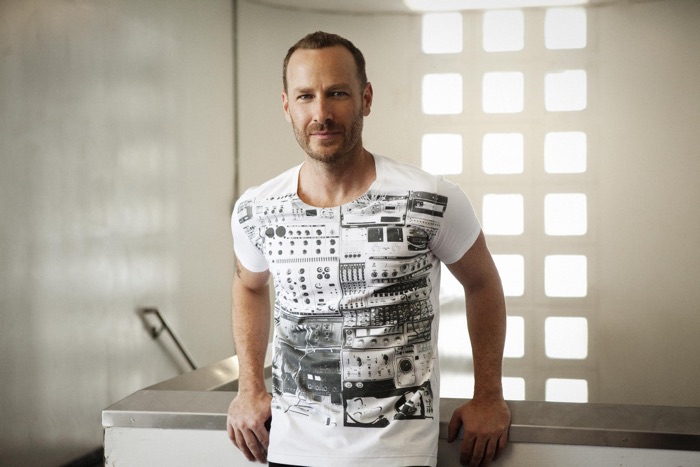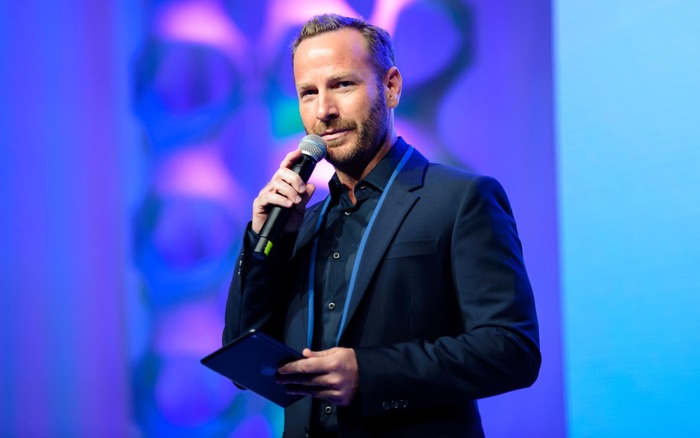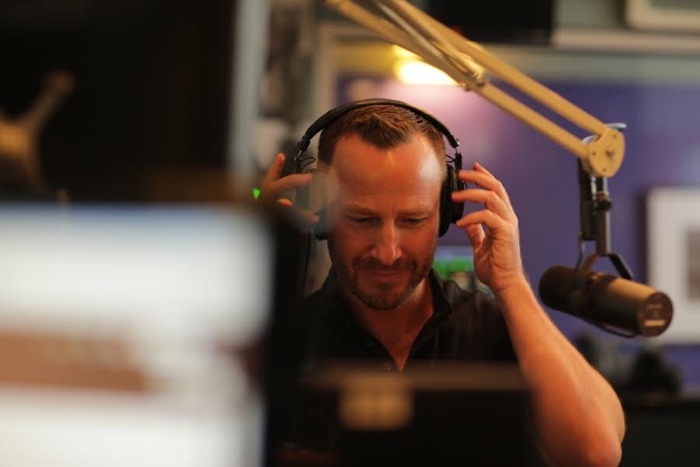Jason Bentley: “The Most Enduring Artists Stick to Their Guns; They’re Purists…”

As music director at KCRW, Jason Bentley is one of the most influential tastemakers in the world. He’s also a major figure in electronica and dance, and will speaking at the upcoming EDMbiz Conference & Expo, happening June 17th and 18th in Las Vegas.
______________________________________________
Digital Music News: You’ve been a huge player in electronic music, dance, and ‘EDM,’ whether that’s with seminal deejays or lobbying the Grammys to expand its awards around the format. So here we are in 2015, but is EDM plateauing?
Jason Bentley: I think it’s finding its roots now, there’s a lot of talk about electronic music hitting the mainstream and threatening a saturation point. And there’s the referenced story of disco being ultimately rejected by the mainstream, though I don’t think that this is a case of history repeating itself. This is more of a continuum, there are layers of the onion.
I feel like it’s stabilizing, broadening its position, its history and identity. There are the superficial indicators, the trends in Vegas for example, but there’s also a more interesting, deeper, more thoughtful approach to dance music evolving.
DMN: EDM starkly stands apart from other verse-chorus-verse genres, and its popularity surged without any help from mainstays like traditional radio and TV. This is clearly a totally different terrain, the rules haven’t really been written. So how can an artist thrive best in this fundamentally different format?
Bentley: I’d say find a context, make a comment, at least have a strong point of view and stick with it. Music has a lot of parallels to fashion, especially this genre of music. There are trends that come from the grassroots, and you need to be a trendsetter and aware of what’s happening right now. And part of that is just standing in it, and being bold enough to stand by it — ‘ya know, it’s gonna be parachute pants,’ and when parachute pants are all the rage, you were there.
It’s your decision as an artist if you’re going to stand by the pop side of EDM, as well as its poppy structure. That’s cool, at least you have a point of view and are working from somewhere.
The most enduring artists have stuck to their guns, they’ve been purists.
Take Above & Beyond, they’ve carved out an impressive career with no help from the mainstream, they sell out at the Greek, they sell lots of music, and they’ve stayed true to this idea of trance. They’re also not your typical rock stars, they lack those rock star qualities.
When you stay on message, whether it’s trendy or not, you put yourself in a better position to keep your fanbase along the way. I question artists that shift direction with where the winds are blowing — that can be very dangerous.
DMN: But can you get stuck sticking to those guns?
Bentley: The trick is to transcend the trend, to not be a sub-genre but to come out of that on your own terms and with a certain ownership of how people see you. That’s the goal, but yeah, I think you have to give your audience something that adds up, that makes sense to them.
I’ve seen a lot of different types of artists, everyone has a different set of pros and cons. You can start to assess whether they’ll have a great career or not. Especially at the early stages, you sort of have to dumb it down, at least down to a t-shirt slogan, at least for some people. There are some that aren’t going to fit a mode, but generally your sound has to match your presence and overall aesthetic, it’s the reason why a lot of stuff from Europe is too challenging for American audiences.
When it’s too difficult for people to grasp, it’s a fatal flaw. I see a lot of fatal flaws, sometimes starting with the name of the band.
I’ll often have the opportunity early on to advise — I can at least say – ‘it’s not too late to make a better decision here,’ they don’t always listen but sometimes I’m able to voice an opinion. I can say, ‘you’re not doing yourself any favors by making it really difficult for an audience to grasp what you’re doing.’
You don’t want to dumb down your message too much, but to achieve success over time, you need to set yourself up properly. And it all starts with finding, and connecting, with your community.
DMN: EDM attracts a much younger audience, yet sometimes ’standing your ground’ takes more than a decade of waiting. Which might explain why a lot of prominent DJs are actually in their 30s and beyond. How does age play a factor in all of this?
Bentley: We’re really in uncharted waters here. Only a handful of [older] people – Fatboy Slim, Carl Cox, Green Velvet – are still at the top of their game, but many are approaching 50 or are past 50, and there aren’t a lot of examples to look at.
One thing that everyone needs to look to and respect is when someone is passionate and driven to share their passion and craft. Age doesn’t trump that.
Take the talent of Carl Cox, the commitment, hookiness, relevance, the fun… these aspects are still readily accessibly to anyone. No doubt that club culture is more for the active, youth demo, maybe because festivals are more of an endurance test for people, and for older people priorities change. They’re not out trying to find that new track.
Look at Fatboy Slim, take that career track versus a newer artist today like Flume. The newer groups have a long way to go before they have a long-term career track like that.

DMN: Short-burst media is surging, whether via Snapchat, Vine, or YouTube, to name a few. And artists are connecting through so many different methods beyond just music. So is it still about the song?
Bentley: Well, I’m veiled in the song, that’s the connection, that is the tissue between us all, that’s what I play all day. And there are general themes that people are hitting over and over in those songs — love, heartbreak, feeling good and feeling bad, stuff falls into those categories. And honesty, the ability to hold it close over time, is one of the challenges for dance music, because it’s so much about the feeling of the moment, the type of the moment. The stuff that me and my friends were into at 21, we lived for new records and singles, and we would buy into the myth around these artists, we would be living for it. But do we listen to these records today? No, it’s just a postcard in the back of our minds; enduring music is really about a great song, one that makes a significant connection for people.
DMN: Where does video fit into all of this? After all, the most ‘listened to’ format is a video, whether it’s highly-produced action, lyrics videos, or simple slideshows. Is this something artists should be focusing on?
Bentley: I’m not that visually inclined, I don’t want to be told what the situation in a song is all about, I don’t want that so much. I’m thinking first about the atmosphere, the sensibility of the sound, then I’m keying into lyrics, the aesthetics, the sounds and the atmosphere. But videos, you can’t deny it, it’s very important for a lot of people, I get it, MTV was big — I was just as glued to it as the next person. But generally in my world, it’s not what I’m looking at.
DMN: There’s a tremendous amount of thought, investment and capital around video. YouTube is now the most important format for the musicians and the music industry, Spotify is trying to layer video into its platform to complete, Vadio is trying to ‘video-ize’ streaming applications and just raised $7.5 million, startups like BAMM.tv are trying to reinvent companies through smart video content. But do people really care passionately about videos in the end?
Bentley: It’s a good question. Really, the video work we do every day, for example we do sessions for artists, there are cases where we’ll enjoy tens of thousands or maybe millions of views. But usually what we post on Youtube gets between 3,500 and 7,000 views, I just don’t know if people care that much about video. We post highlights on our Youtube channel, and we get a breakout for someone like Ed Sharpe or Gotye and it blows up.
I’m not so sure how this evolves with the whole move to streaming, it seems like there’s so much potential in how people are going to consume and listen to music. So maybe there’s something we haven’t thought of.
You mentioned lyric videos — those are kind of cool, you can at least meditate on the lyrics and think about the song. It turns out it’s something that a band can lead with, they can grow out of a lyrics video. So it would be great to see a resurgence in that space. It would be nice to see that.
DMN: We’ve talked about audiences shifting towards shorter bits of media, and the resulting surges we’re seeing around mega-players like Snapchat, Vine, and YouTube. But beyond that, data is now showing that music listeners frequently skip a song on Spotify before it’s done. That’s affecting artistry and career paths as well: Sean Mendez breaking out on Vine sticks out as a prominent example. Should we be reconceptualizing the full-length song in the process?
Bentley: It’s a sign of the times, the post-modern world where things are broken up into hooks and samples. But I personally love times when songs are so important to you — you just play it multiple times, over and over again.
As far as my point of view, I’m a deejay and I approach my craft with monk-like precision. I play attention to every single segue, I use music software programs that show me the waveforms and there’s no guessing when it ends; I can beat-match and loop sessions. I’m obsessive about the music environment that I’m creating, I’m like a pilot taking people on a trip, I’m creating an atmosphere and guiding them safely. I’m letting songs breath, I couldn’t imagine interrupting things and jumping around; I’m looking for the right transitions to different songs. If I play deejay at a party, I’m jumping around genre-wise, and you don’t even have to get up to do it. But I’m still really interested in telling the story and taking care of the transition.

DMN: There’s the convenience of streaming, but at what cost?
Bentley: There’s been a lot of talk about the rise of vinyl sale, but what’s the other side? Yes, everything is in the cloud, there’s no ownership, but I wonder if there’s a growing part of the populace that really does want to own something, and are we set up to cater to that interest? With the move to streaming, I wonder if there’s going to be an answer here, if people want to own something.
I totally love that there’s access to data on what the trends are, but I can only chalk it up to how the world is today: sometimes I only channel surf, I jump around and don’t watch anything for half-an-hour, because that’s how it’s presented to me. You just jump around.
Maybe that’s the strongest argument for the curatorial, giving people the better filters, the better signal-to-noise ratio, applying that opinion and human touch.
DMN: Maybe that explains the growth of more hands-off concepts like Songza, and the surge in listening hours on Pandora. Are you seeing similar increases for your curated, lean-back curatorial approach?
Bentley: I could only look at our membership with that test. At KCRW, we try to get the passive listener to become a paying member, so I have seen growth on that side, but I don’t pay attention to the ratings periods. Honestly, I don’t know how much reliability a service like Arbitron has: they have a panel that they put together and it seems so random to me. They coincidentally add one person who’s an NPR listener and our ratings go through roof.
But having a sense of our connection with our community is most important, and L.A. travels really well. People are really interested in what this station out of Santa Monica is doing, and we do world class programming. It’s a wonderful thing, it’s pretty unique, and yes I see the growth. We’ve had to keep pace with the changes: whenever a new platform comes along our policy is to embrace and inhabit it and not feel threatened by it — because ultimately it spreads the word on what we’re doing.
Ultimately, we’re trying to get as much members to support our cause, and stimulate the intellect of our listeners and members.
DMN: Perhaps the biggest challenge for artists is connecting as strongly with their natural audiences, instead of searching around for something bigger and more ‘now’.
Bentley:
It’s just too tricky when you try to reinvent the wheel. I respect different looks, producers, and ideas, but it often doesn’t work out for the group.
It’s sad to say, but that’s one thing I really take away from our conversation.
The post Jason Bentley: “The Most Enduring Artists Stick to Their Guns; They’re Purists…” appeared first on Digital Music News.
Source: Industry News
Leave a Reply
Want to join the discussion?Feel free to contribute!